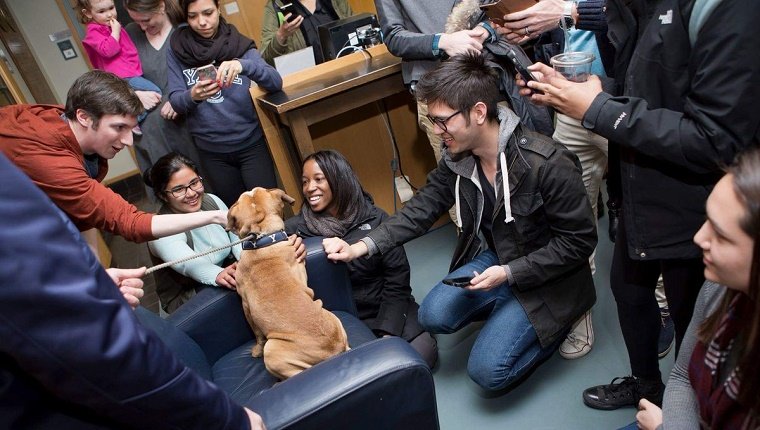The dog days of finals: Therapy dogs are visiting #UNC #KenanFlagler to help #MBA students ease the stress of exams pic.twitter.com/N4tlxbYafw
— UNC Kenan-Flagler (@kenanflagler) December 18, 2013
Colleges across the United States are reaching out to therapy dog programs for the many benefits they provide to students. Universities and schools can be extremely stressful settings for students, creating a strain on resources that can help young people cope with emotions, disorders, or relationships. Therapy dogs provide an inexpensive way to assist students in focusing on their education. They provide a comforting presence that every college dorm should have available to young people in need. Here are ten major benefits of having a therapy dog in every college dorm.
1. Therapy Dogs Reduce Anxiety And Loneliness
College can be one of the most stressful times in a person’s life. On top of academic performance, many students have to cope with being away from home for the first time, dealing with new relationships, and finding out who they are as individuals. These challenges can lead to anxiety and loneliness, and therapy dogs are shown to reduce those feelings. Researchers at Georgia State University, Idaho State University, and Savannah College of Art and Design conducted a joint study that showed that therapy dogs reduced anxiety and loneliness in students by 60 percent.
2. They Cut Down Strain On Counseling Resources
More than half of students who go to campus health clinics site anxiety as a health concern according to a nationwide study conducted by the Center for Collegiate Mental Health at Penn State. Due to the pressures of high school, college students arrive on campus pre-loaded with stress. This puts a strain on counselors and resources that help students deal with these problems. Having therapy dogs on campus reduces the need for other counseling services, freeing up those resources for other students who need them.
3. Improving Emotional Health Also Improves Physical Health
The simple act of petting a dog is shown to actually reduce blood pressure. Lower levels of stress hormones like cortisol and an increase in oxytocin are also associated with pet therapy and contribute to respiratory and cardiovascular health. In short, reducing feelings of anxiety and depression positively affects physical health.
4. Dogs Allow For Stronger Interpersonal Communication
University of Ottawa Human Kinetics professor Audrey Giles brought her her certified therapy dog, an 8-year-old Border Collie mix named Tundra, to office hours so stressed students could pet her and feed her treats. The first week she tried this, 20 students showed up. The next week, 60 students were there to play with Tundra. Dogs encourage students to seek the help they need and interact with other people by providing a safe, non-judgmental presence. People feel safer about being themselves and opening up when dogs are around, and that’s important for students who are trying to learn or seek comfort.
5. The Cost To The University Is Minimal
Rocky the therapy dog is both therapeutic and studious. Visit to @BassLibrary last week.#stressrelief #therapydogsofbass #puppylove @Yale pic.twitter.com/DZLU5iwYBr
— Yale Library (@yalelibrary) March 11, 2017
Most therapy dog programs that cater to universities and colleges are funded mostly through donations, and the fees for training and certification are almost always provided by the dogs’ owners. The dogs also stay with their families, not at the school, so the cost for food, supplies, and veterinary bills go to the owners of the dogs. Having therapy dogs in schools is cheap–much cheaper than hiring extra counselors or treating stress-induced disorders at medical clinics.
6. They Help Counselors Connect With Students
Dog-assisted therapy sessions can reduce stress for students who are slower to open up and trust counselors. Dr. Lindy Parker of Georgia State University says, “The presence of a therapy dog facilitates a therapeutic connection between the client and the mental health professional. When you’re trying to do mental health work with someone, establishing that therapeutic relationship and rapport is so important.” Establishing a rapport comes more quickly and easily with a therapy dog so that effective treatment can begin.
7. Therapy Dogs Help Grieving Students Process Tragedy
College can be a tough time to deal with personal tragedy. Amanda Slife, an Oklahoma State University animal science major, was grieving the loss of her mother who died of colon cancer. She found comfort in Charlie, a Shepherd mix who is one of more than 20 therapy dogs available for students every day through the school’s pet therapy program, Pete’s Pet Posse. Slife is just one of many students dealing with tragedy, and having the loving presence of a therapy dog can help them feel more hopeful during a dark time.
8. Dogs Can Help Students Who Feel Homesick
Handsome Dan was a big hit at the Medical Library today! @Yale @BeineckeLibrary @YaleMedHisLib @YaleMed @YaleMedHum @YaleMedAlum @YNHH pic.twitter.com/SSBuKhUgPF
— Yale Library (@yalelibrary) March 22, 2017
A Harris Poll conducted in 2011 found that 91% of pet owners consider their pets to be members of their families, and many homesick students feel uplifted when they are able to pet and play with a dog. Dr. Kathy Adamle of Kent State founded Dogs on Campus, a pet therapy program for universities, says, “Students are worried about papers and exams and can also get homesick. The dogs help with all of that.”
9. The Dogs Love It, Too
Pet therapy at koonce hall pic.twitter.com/B170RoNbJb
— Dogs On Campus (@KSUPetTherapy) September 21, 2016
One of the reasons therapy dogs are so good at what they do is that they love the extra attention of new people giving them lots of pets and love. Therapy dogs get the added benefit of special training that deepens their connections with both their owners and with other people. One Dogs on Campus volunteer, Flo Hoss, says therapy visits are a favorite of her dog, Luke. He gets excited every time they go. Hoss says, “My favorite thing is watching him be so happy.” Clearly the pups are getting just as much out of it as the humans.
10. Dogs Foster Empathy And Understanding

Research by psychologist Robert Poresky of Kansas State University shows a correlation between attachment to a pet and higher levels of empathy. Dogs teach us about unconditional love, about being non-judgmental, and about having concern for someone other than yourself. They also teach us how to read nonverbal cues. All of these are important skills for creating understanding between students who may have come from completely different backgrounds or have completely different life experiences. Empathy helps people respect others and listen, and that’s important in an atmosphere of high stress and anxiety.
Would you like to see more therapy dogs on campuses helping students? What other ways do you think pet therapy can help young people cope with being at colleges and universities? Let us know in the comments below!









